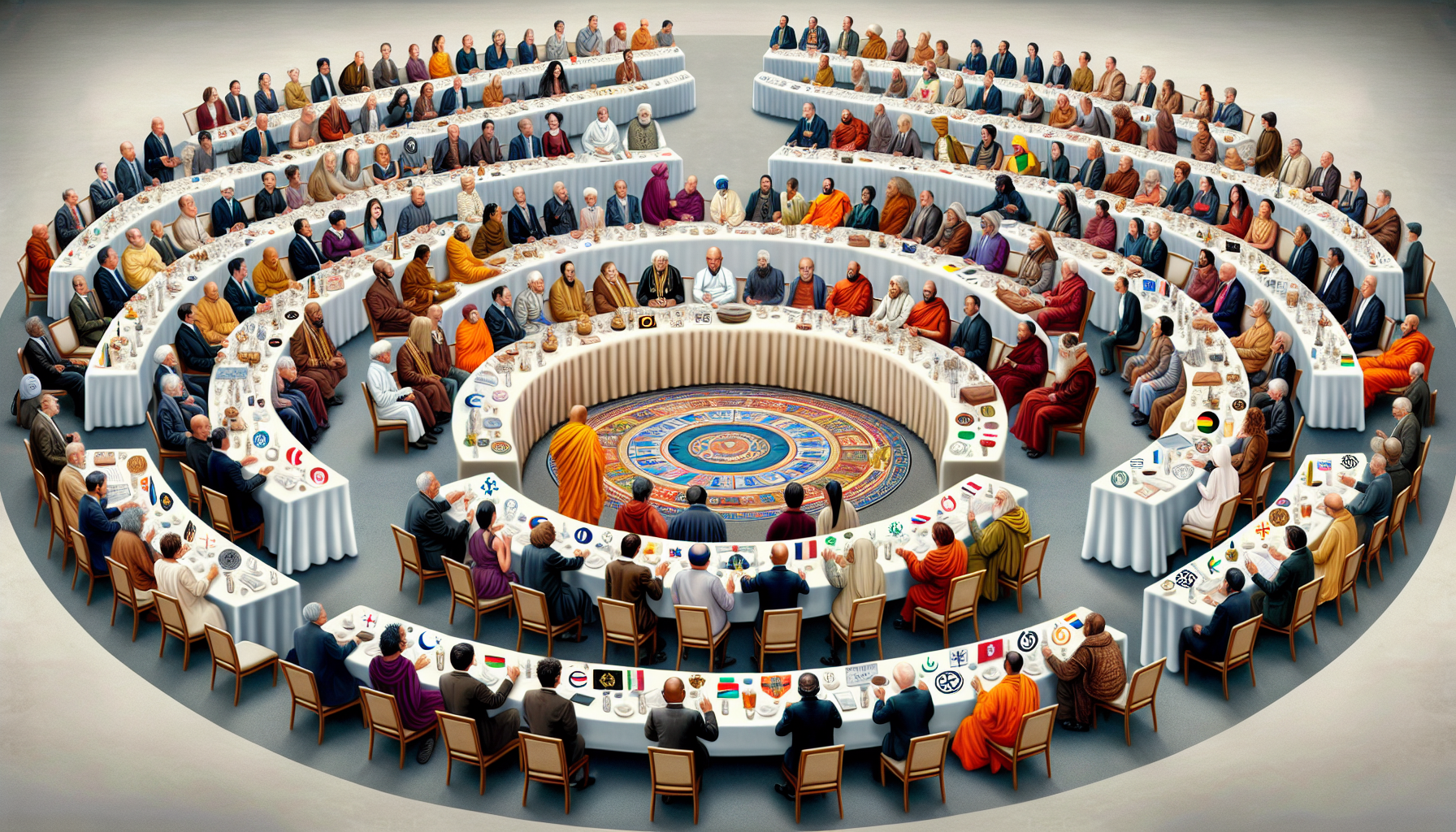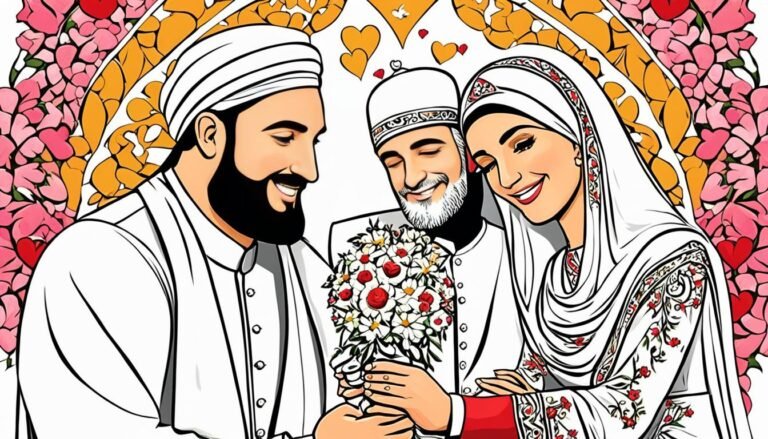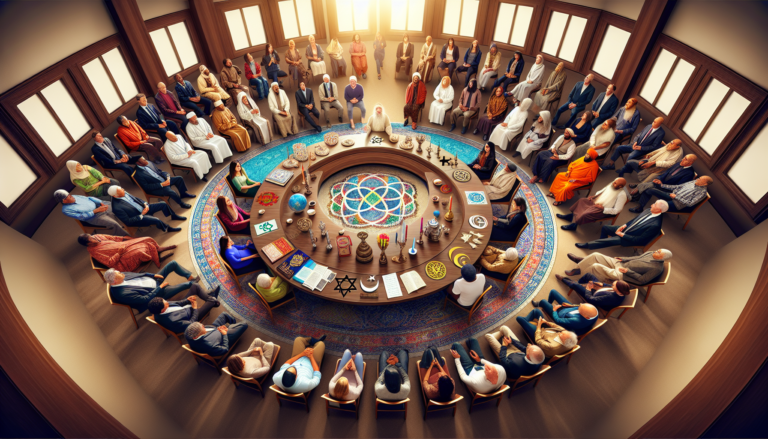Unveiling Paths to Peace: Interreligious Dialogue Conferences
Interfaith Dialogue Initiatives
Bringing people from different faiths together to chat and understand each other better is the goal of many organizations. Let’s check out two cool ones: Brain Traffic’s Inclusive Conferences and YCDiversity’s Workshop Offerings.
Brain Traffic’s Inclusive Conferences
Brain Traffic is all about making sure everyone gets a voice. They host conferences like Confab and Button where they invite speakers from all walks of life. It doesn’t matter if you’re young, old, black, white, or anything in between—everyone’s welcome (Brain Traffic).
They don’t just talk the talk; they walk the walk. Brain Traffic makes sure BIPOC (Black, Indigenous, and People of Color) professionals get a chance to shape the events. This means more voices and stories from people who often don’t get heard (Brain Traffic). And with the shift to virtual events thanks to Covid, they’ve been able to offer more scholarships, making it easier for folks to join in.
YCDiversity’s Workshop Offerings
YCDiversity (Youth Cultural Diversity) is all about getting young people to talk and work together, no matter their faith. They have over 60 workshop guides that help middle and high schoolers learn about inclusion and justice (YCDiversity).
One of their standout workshops gets Muslims, Jews, and others to team up for social justice. It’s all about finding common ground and tackling big issues together.
They also run sessions that dive into how faith and social identities mix. These workshops get folks thinking and talking about their beliefs and how they fit into the bigger picture (YCDiversity).
And let’s not forget their workshops on Islam and Islamophobia. These are safe spaces where students and adults can ask questions and learn about Islam, busting myths and fighting discrimination (YCDiversity).
Thanks to Brain Traffic’s inclusive conferences and YCDiversity’s workshops, people from different backgrounds are coming together, chatting, and working towards a more understanding and empathetic world. These efforts are making a real difference, creating places where meaningful conversations can happen and helping build a more harmonious society.
Why Interfaith Dialogue Rocks
Jumping into interfaith dialogue conferences can be a game-changer for both individuals and communities. It helps folks understand each other better, pushes for social justice, and gets everyone working together for peace.
Pushing for Social Justice
Interfaith dialogue isn’t just about learning new stuff about other religions; it’s about bringing different faiths together to tackle shared problems and work towards common goals. When people from various religious backgrounds unite, it promotes inclusivity, empathy, and a sense of togetherness.
By teaming up, communities can push for policies that reflect their shared values, like economic justice, racial equality, and religious freedom. Together, faith communities can make their voices louder and drive meaningful change that benefits everyone.
Teaming Up for Peace
Interfaith dialogue conferences are also great for building bridges between different religious groups. By encouraging conversation and cooperation, these events help faith communities find common ground and understand each other better (YCDiversity).
Working together in these conferences can lead to joint projects aimed at promoting peace and reconciliation. When folks from different backgrounds come together to solve shared problems, they’re more likely to find peaceful solutions and foster a culture of respect and acceptance.
By joining interfaith dialogue conferences, individuals and communities can help create a more inclusive and peaceful society. These events offer a space for sharing experiences and perspectives, giving marginalized communities a chance to be heard (Brain Traffic). Thanks to virtual events, these conferences are now more accessible, offering scholarships to more participants and keeping the momentum for inclusivity going (Brain Traffic).
Interfaith dialogue conferences not only spark important conversations but also empower people to work together for a fairer and more peaceful world. By valuing diversity and promoting cooperation, these events help build understanding and create opportunities for positive change.
Interreligious Dialogue Practices
Building bridges and promoting harmony among different religious communities is no small feat, but interreligious dialogue makes it possible. Let’s explore the different ways people from various faiths come together to understand each other better and work towards common goals.
Types of Dialogue
Interreligious dialogue isn’t a one-size-fits-all thing. In the Catholic tradition, there are four main types:
-
Dialogue of Life Experiences: This is all about sharing personal stories, traditions, and customs. It’s like sitting down with a friend and swapping tales from your daily lives. You get to see the world through someone else’s eyes and appreciate their unique perspective.
-
Dialogue of Work and Action Together: Here, folks from different religious backgrounds team up on community projects. Whether it’s building a playground or organizing a food drive, working side by side helps break down barriers and build mutual respect.
-
Dialogue of Theological Exchange: This one’s for the deep thinkers. Participants dive into discussions about their beliefs, study sacred texts, and look for common ground. It’s about understanding each other’s faiths without losing sight of your own.
-
Dialogue of Religious Experience: This type focuses on sharing personal spiritual journeys. It’s a chance to talk about how faith shapes your life and hear how it does the same for others. These conversations can be eye-opening and deeply moving.
Interfaith dialogue isn’t just for Catholics, though. It includes people from all religious traditions and even those who are non-religious. The goal is to foster understanding and mutual respect across the board.
Facilitating Intercultural Cooperation
Bringing people from different cultural backgrounds together is a big part of interreligious dialogue. When folks from various cultures and faiths engage in meaningful conversations, they learn from each other and build lasting relationships.
Events like interfaith conferences, workshops, and collaborative projects provide the perfect setting for these interactions. They help break down stereotypes and promote inclusivity, creating a sense of global community.
Organizations like Soka Gakkai International (SGI), a Buddhist lay organization, are active in this space. SGI’s leader, Daisaku Ikeda, has had published discussions with leaders from various faiths, promoting peace and understanding. The Pontifical Council for Interreligious Dialogue (PCID) also works with the World Council of Churches and other groups to facilitate these conversations.
By embracing different types of dialogue and fostering intercultural cooperation, interreligious initiatives help build understanding, promote peace, and celebrate our shared humanity. These practices bring people together to tackle common challenges and create a more harmonious society.
Interfaith Dialogue Events
Bringing people together from different faiths isn’t just a nice idea—it’s essential. Interfaith dialogue events, whether on a global stage or in your local community, help break down barriers, foster cooperation, and build bridges between diverse religious traditions. These gatherings offer a chance for meaningful conversations, shared experiences, and a deeper understanding of one another. Let’s dive into two main types: global conferences and local panel discussions.
Global Conferences and Forums
Think of global conferences and forums as the big leagues of interfaith dialogue. These events attract scholars, religious leaders, policymakers, and anyone passionate about interfaith cooperation. They tackle big issues like religious freedom, social justice, and peacebuilding.
Take the Geneva Centre for Human Rights Advancement and Global Dialogue, for example. They host conferences and panels that bring together voices from various faiths to discuss crucial topics. In 2019, they organized a conference on faith and equal citizenship rights during the 5th World Forum on Intercultural Dialogue at the Baku Congress Center. Another notable event was in 2018 at the United Nations Office in Geneva, where they debated the role of education in countering violent extremism and promoting peaceful societies (Geneva Centre for Human Rights Advancement and Global Dialogue). These global gatherings are like melting pots of ideas, where diverse perspectives come together to advance interfaith dialogue.
Local Panel Discussions and Debates
Now, let’s zoom in on the local scene. Local panel discussions and debates are where the rubber meets the road. These events often happen in community centers, places of worship, schools, and other local spots. They offer a space for people from different religious backgrounds to have open, respectful conversations, explore common values, and tackle shared challenges.
Topics at these local events can range from religious discrimination to interfaith collaboration for social justice. The goal? To build understanding, forge relationships, and promote peaceful coexistence within the community.
By participating in these local dialogues, folks can gain a richer appreciation for the diversity of religious beliefs and practices, challenge stereotypes, and contribute to a more inclusive society.
Whether it’s a global conference or a local panel discussion, interfaith dialogue events are crucial for promoting understanding, tolerance, and cooperation among people of different faiths. They provide platforms for meaningful engagement, where participants can learn from each other, challenge their own biases, and work towards a more peaceful and inclusive world. Curious to learn more? Check out our articles on the definition of interfaith dialogue, the importance of interfaith dialogue, and organizations involved in interfaith dialogue.







